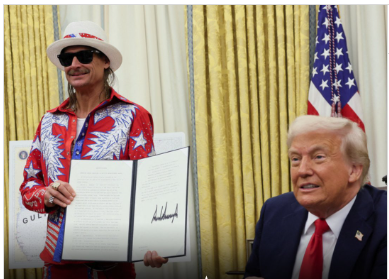Former President Donald J. Trump signed an executive order that has the potential to drastically change how Americans purchase tickets in a time when live entertainment has become incredibly costly and frequently out of reach for regular fans. Trump’s “commonsense reform” of the live event industry may give concertgoers who have been priced out of their favorite shows some hope.
The directive directs federal agencies to take action against individuals who use bots and misleading pricing models to take advantage of the ticketing system. The administration hopes to reduce artificial scarcity, improve price transparency, and hold resellers responsible for the glaringly high prices that afflict secondary markets by coordinating efforts across the FTC, DOJ, and Treasury.
Trump Executive Order – Ticket Scalping Reform
| Element | Details |
|---|---|
| Signed By | President Donald J. Trump |
| Primary Focus | Ticket scalping, bot crackdowns, pricing transparency, market fairness |
| Lead Agencies Involved | FTC, DOJ, Department of the Treasury |
| Enforcement Tools | BOTS Act, tax code scrutiny, antitrust evaluations, multi-agency reporting |
| Economic Context | Live events generate $132.6B annually, supporting 913,000 jobs |
| Secondary Market Issues | Markups reaching 70x face value; artist revenue not increased; consumer costs skyrocketing |
| Official Website Link | whitehouse.gov |
Why Customers Might Find This Order Appealing
Live performance ticket prices have significantly risen over the last ten years, outpacing both inflation and wage growth. Recent reports indicate that many Gen Z fans have been prepared to incur credit card debt in order to attend a single performance. For example, when tickets on resale platforms skyrocketed into the five-figure range, Taylor Swift’s Eras Tour sparked a national dialogue about price gouging.
If correctly implemented, Trump’s executive order may be incredibly successful in reducing these abuses. It calls for interagency cooperation to hold bad actors financially responsible and advocates for the full implementation of the BOTS Act, which has lain dormant since its creation in 2016. This action establishes a 180-day timeline for results, which may greatly accelerate regulatory momentum in contrast to earlier legislation that was symbolic but lacking in substance.
Industry Voices Respond: Cheer, skepticism, and cautious optimism
Industry titans reacted promptly, as was to be expected. StubHub commended the endeavor, emphasizing how it could prevent dishonest resellers from taking advantage of algorithmic flaws. In a carefully worded endorsement, Live Nation, the parent company of Ticketmaster, expressed support for “meaningful resale reforms”—a phrase that is purposefully ambiguous but shows alignment in response to public pressure.
Longtime music critic Bob Lefsetz, however, wasn’t persuaded. He referred to the order as “grandstanding,” pointing out that, primarily because of insufficient funding, the BOTS Act has only been implemented once in eight years. He made the straightforward claim that even the most ambitious reforms might remain performative in the absence of funding. Nevertheless, the directive puts agencies under new pressure to act and generates political pressure.
What Needs to Happen and What Could Change
Three things need to happen for change to be particularly evident and felt by ticket buyers: bot enforcement needs to be genuine and consistent, secondary platforms need to reveal prices up front, and artists need to have more control over the distribution of their tickets. This executive order pushes all three in the right direction by combining tax enforcement and multi-agency oversight.
Crucially, this occurs just as customer annoyance reaches a breaking point. Fans welcomed digital concerts during the pandemic, but demand has increased dramatically since the lockdown, only to be confronted by incredibly opaque pricing structures. Many fans no longer comprehend why, frequently without justification, a $60 ticket can now cost $250. The push for transparency in this executive order may help to rebuild some of that lost confidence.
Long-Term Effects: A Fairer Marketplace?
Going forward, it’s possible that signaling as much as enforcement will be key to the success of Trump’s executive order. It challenges both party policymakers to reexamine a topic that notably impacts independent venues, cultural institutions, and working families. If additional laws are passed, perhaps involving price caps, artist supervision, or tech platform accountability, the order may mark a sea change in a sector that has long been accused of prioritizing profits over people.
The directive establishes the framework for upcoming reforms by drawing attention to the problem and requiring interagency cooperation. Additionally, it tells scalpers that the days of unregulated markups and digital hoarding might be coming to an end.


